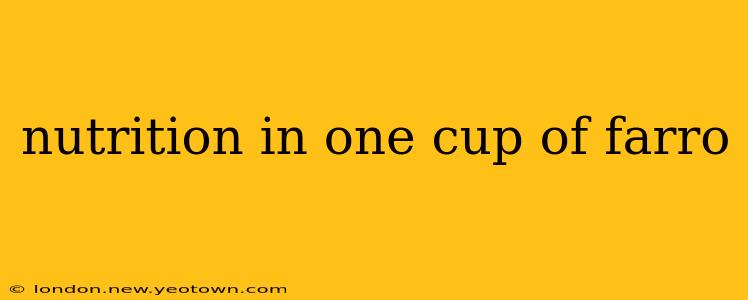Farro. The name conjures images of rustic Italian cuisine, hearty soups, and wholesome salads. But beyond its culinary charm lies a nutritional powerhouse packed with benefits for your health. Let's embark on a journey to explore the nutritional profile hidden within just one cup of this ancient grain.
Imagine a sunny Tuscan field, where the golden stalks of farro sway gently in the breeze. For centuries, this grain has been a staple, a symbol of sustenance and robust health. Now, let's uncover the secrets behind its enduring popularity. One cup of cooked farro, typically about 240 grams, boasts an impressive array of nutrients crucial for overall well-being.
What are the Nutritional Benefits of Farro?
One cup of cooked farro offers a significant amount of:
-
Fiber: This is where farro truly shines. It's a champion of dietary fiber, providing a substantial boost to your daily intake. Fiber aids digestion, promotes regularity, and contributes to feelings of fullness, assisting in weight management. The high fiber content also helps regulate blood sugar levels, preventing those dreaded energy crashes.
-
Protein: Farro is a complete protein source, meaning it contains all nine essential amino acids your body needs but can't produce on its own. This makes it a valuable addition to vegetarian and vegan diets, ensuring you're getting a complete protein profile.
-
Magnesium: This vital mineral plays a critical role in numerous bodily functions, including muscle and nerve function, blood sugar control, and blood pressure regulation. Farro is a good source of magnesium, contributing to overall health and wellness.
-
Manganese: Another essential mineral, manganese supports bone health, wound healing, and metabolism. A single cup of farro offers a notable amount of manganese.
-
Iron: Crucial for red blood cell production and oxygen transport throughout your body, iron is another nutrient found in good quantities within farro.
What Vitamins and Minerals are in Farro?
Beyond the macronutrients, farro also offers a range of vitamins and minerals, including:
- Vitamin B6: Essential for brain development and function, as well as the formation of red blood cells.
- Selenium: A powerful antioxidant that protects your cells from damage caused by free radicals.
- Zinc: Supports immune function and wound healing.
- Phosphorus: Essential for bone health and energy production.
How Many Calories are in One Cup of Farro?
The calorie content of one cup of cooked farro hovers around 210-220 calories, making it a relatively low-calorie, high-nutrient food option. This makes it a perfect choice for those seeking to maintain a healthy weight or incorporate more whole grains into their diet.
Is Farro Gluten-Free?
No, farro is not gluten-free. It contains gluten, a protein found in wheat, rye, and barley that can cause problems for people with celiac disease or gluten sensitivity. If you have a gluten intolerance, farro is not a suitable choice.
How Does Farro Compare to Other Grains?
Compared to other grains like brown rice or quinoa, farro boasts a higher protein content and significant fiber advantage. While quinoa is also a complete protein, farro often surpasses it in overall fiber contribution. The nutritional profile varies slightly depending on the type of farro (e.g., farro piccolo, farro medio, farro grande), but overall, it stands as a nutrient-dense grain option.
How Can I Incorporate Farro into My Diet?
Farro's versatility shines in its culinary adaptability. It can be a base for salads, a hearty addition to soups and stews, a side dish alongside roasted vegetables, or even an ingredient in flavorful grain bowls. Its slightly nutty flavor complements a wide array of ingredients and seasonings, making it a delightful and healthy addition to your daily meals.
This exploration into the nutritional wealth of one cup of farro demonstrates its potential to elevate your diet and enhance overall well-being. From its impressive fiber content to its complete protein profile and array of vitamins and minerals, farro is a grain worthy of a prominent place in your culinary repertoire. Remember to choose organic farro whenever possible to maximize its nutritional value and minimize potential exposure to pesticides.

